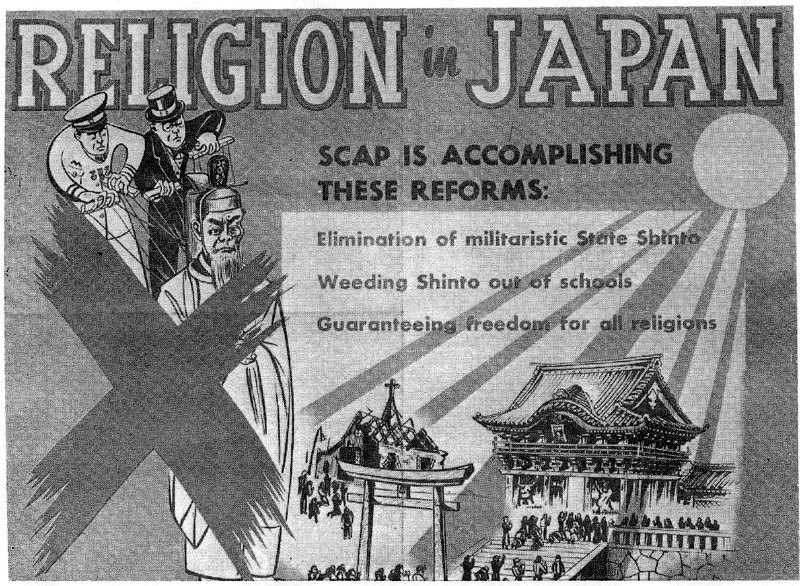One of the first Religious Studies courses in which I enrolled was titled “Japanese Religion.” There were several themes running through the course, but the one that stuck with me as the most important was something the professor asked during the first meeting of the class:
The course is called “Japanese Religion”; over the semester, think about that phrase – would it be better to say “Japanese Religions”? How about “religions of Japan”? Or, is “religion” the best word to use to describe the Japanese traditions we’re studying?1
The implications of the latter question are considered by Jason Ānanda Josephson, scholar of East Asian religions and religious studies theory, in this informative interview with the Religious Studies Project. Josephson and interviewer Brad Stoddard explore how the concept of “religion” was translated, discussed, and applied in 19th Century Japan.
Josephson’s book, The Invention of Religion in Japan (University of Chicago Press, 2012), forms the backbone of the conversation. Josephson explains that he has always had an interest in East Asian religion, as well as the theory of religion and religious studies, and in his doctoral research he put those pieces together. The result is a book that critiques the category of religion using the Japanese situation as a case study. Josephson relates how, in post-1853 Japan, there was a significant discussion taking place among the Japanese elite about what the European idea of “religion” meant, how it fit (or didn’t) with existing traditions in Japan, and also, how the concept of the “secular” applied to Japanese society at the time. Josephson’s primary case study involves Shinto, rather than Buddhism, although Josephson hopes to explore Buddhist traditions in Japan in a future work.
Josephson’s critique of the category “religion” as it relates to Japan is part of an on-going discussion among scholars as to the accuracy, relevance, and necessity of that concept. (Scholars such as Timothy Fitzgerald, Russell T. McCutcheon, Talal Asad, and Tomoku Masuzawa are mentioned in the interview as key figures participating in this critique.) While I would not describe myself as a theorist primarily, or consider my main interest to be theories of religion, I have come to realize that questions about the nature of “religion,” what scholars mean when they write about “religion,” and the categorization of “religious” traditions cannot be overlooked and must be grappled with prior to studying a “religious” tradition.
When I was a student in the Japanese Religion course, I had not yet been introduced in a meaningful way to the critiques of the concept of “religion.” What seemed problematic to my novice eyes was the disjunction between the different implications of the phrases “religion in Japan,” “Japanese religion,” and/or “Japanese religions.” By the end of the course, I decided that the least problematic way to think about the topic was as “religions in Japan.” This didn’t tackle the truly important piece – namely, the category of “religion” – but it did seem to be more neutral and inclusive than any of the other phrases. In my graduate work, these questions of naming and labeling recurred – my interests centered around one of the Buddhisms in Japan, not the monolithic idea of “Japanese Buddhism.” The latter implies that there is one Buddhism that can be described as Japanese. I can think of (at least) two traditions of Buddhism that flourished and took on a “Japanese” approach over time, as well as several of the New/Emergent Religious Movements which originated in Japan and claim a Buddhist lineage. Ultimately, the use of terms like “Buddhism” and “religion” in the singular seem to be neither specific nor descriptive enough to capture the richness and diversity of the actual world. Josephson’s perspective adds that necessary final dimension to anyone studying “religion” in Japan: since it is both an imported and manufactured category, can it be used reliably by scholars to discuss Japanese traditions?
In the interview, Josephson mentions in passing that the title of his work (The Invention of Religion in Japan) could have just as easily been either The Invention of Superstition in Japan or The Invention of Secularism in Japan. I find this a particularly fascinating comment, as those three words – religion, superstition, secularism – each have a distinct implication. However, as Josephson demonstrates throughout the interview, Japanese society had to come to terms with those three ideas as a package. Was Shinto a religion or superstition? What about Buddhism? Is Japan a secular nation? Is Japan a modern nation? Since one could not be both “modern” and “superstitious,” that meant that Shinto could not be a superstition if Japan wished to take its “place” among the nations of the modern world. However, Josephson also points out that while colonialism often imposed categories upon a colonized people, that was not entirely the case in Japan. Japanese scholars involved in the (literal and cultural) translation of the concepts of religion, superstition, and secularism investigated what these terms meant to Europeans and then negotiated the idea within Japanese society, demonstrating a degree of agency not often seen during interactions between Western and Asian societies in the 19th century.
Not only am I eager to read The Invention of Religion in Japan, but I am also looking forward to Josephson’s next project, discussed at the end of the interview. The project is currently titled “Myth of Disenchantment: Magic, Modernity, and the Birth of the Human Sciences”; Josephson describes this as a project to analyze European society, specifically those parts of Europe that did not match up to the claims of modernity made by European scholars. Josephson’s novel approach analyzes these claims of modernity – and the disjunction between scholarly claims and reality – through the lens of postcolonial theory, using the world outside of Europe to analyze Europe.
1 Or at least, that’s my recollection of the instructor’s remarks! I am paraphrasing, not quoting directly.
References
Asad, Talal. Genealogies of Religion: Discipline and Reasons of Power in Christianity and Islam. Johns Hopkins University Press, 2009.
Ellwood, Robert S. Introducing Japanese Religion. New York: Routledge, 2008.
Fitzgerald, Timothy. The Ideology of Religious Studies. Oxford: Oxford University Press, 2003.
Josephson, Jason Ānanda. The Invention of Religion in Japan. Chicago & London: University of Chicago Press, 2012.
Masuzawa, Tomoku. The Invention of World Religions: or, How European Universalism was
Preserved in the Language of Pluralism. Chicago: University of Chicago Press, 2005.
McCutcheon, Russell T. [See Dr. McCutcheon’s website for a list of his work]
Tanabe, George J. (ed). Religions Of Japan in Practice. Princeton: Princeton University Press, 1999.



